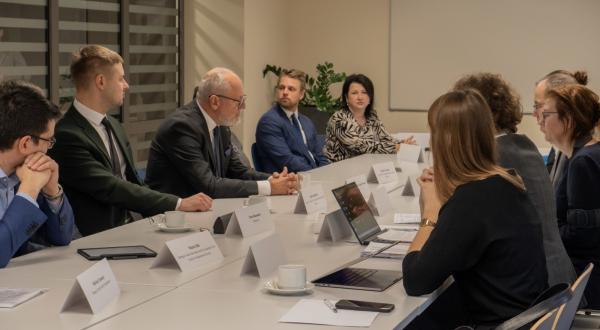RSU Employed Simulation Training at Latvian Hospitals to Identify and Treat COVID-19 Patients
Before the epidemic reached Latvia last week, Rīga Stradiņš University (RSU) was actively following the latest developments in the world. In response to this the RSU Medical Education Technology Centre (METC) developed a simulation scenario for identifying patients with the disease caused by the COVID-19 virus and for practising the next steps when faced with a diagnosed patient. Initial training took place in the admissions departments of clinical university hospitals.
The COVID-19 scenario simulation has been developed based on recommendations by the World Health Organisation (WHO) and the European and Latvian Centres for Disease Prevention and Control and by using prior experience in developing and implementing simulation scenarios. The goal of this simulation was to ensure that staff is prepared to identify and diagnose COVID-19 patients, as well as to be ready for action when coming into contact with such cases. The priority is to help patients, protect hospital workers and others from infection, as well as eliminate the risks of the infection spreading.
Ieva Šlēziņa, Head of RSU METC, explains: 'As a method, simulation entails the acquisition of clinical skills and competences in a safe and controlled environment. A simulation-based approach to medical education is especially useful to prepare for non-standard situations. I believe that all hospitals worldwide are both ready and not ready for COVID-19 patients at the same time. We are aware of the theories and algorithms, but emotions and stress can take over in practice. The equipment you need could be located in another unit, or misunderstandings between colleagues could arise under pressure. Working with simulations in advance in a real environment coupled with debriefings can significantly increase how prepared healthcare facilities are for real life situations and streamline communication between doctors and nurses. I am proud of the RSU METC's reaction and involvement in increasing the quality of patient safety and the quality of health care."
Reinis Balmaks, a paediatrician at the Children’s Clinical University Hospital and a simulation instructor and lecturer at RSU METC, explains the simulation: 'During the COVID-19 scenario simulation, a patient arrives at the admissions unit with respiratory failure. His sister has recently returned from a skiing resort in Northern Italy. Staff must identify whether the patient has COVID-19, isolate them and take the appropriate precautions. The patient's condition gets worse and the hospital’s intensive therapy team gets involved. The patient is then replaced with a mannequin for the trainee to be able to execute the necessary procedures to stabilise the patient.'
Aija Vilde, an Infectologist at the Consultative Department of Infectology and Hospital Epidemiology at Pauls Stradins Clinical University Hospital, believes this training is a great way to see how the algorithms work in real life and to identify where improvement is needed. 'We are glad to see this initiative by RSU. The doctors are responsive and happy to get involved. Simulation training like this is crucial to improve the quality of patient care and in this case also prevent the further spread of the infection at in-patient clinics. We hope for further collaboration with the METC Centre for Simulation in the future,' says Vilde.
RSU continues to purposefully invest in the simulation-based training process for healthcare students and practising specialists in order to refresh and improve their competences and ensure modern education. So far 15,000 students and medical residents have studied and improved their skills at METC.




